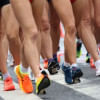British cycling bans trans, non-binary athletes from competing in female category

British Cycling became the latest sports governing body to ban transgender women from competing in the female category of competitive events on Friday, tightening its rules around participation to "safeguard the fairness" of the sport.
Announced after a nine-month policy review, the new rules divide cyclists into "female" and "open" categories and will come into effect by the end of 2023.
The female category remains for those whose sex was assigned female at birth and transgender men who are yet to begin hormone therapy. The open category will be for male athletes, transgender women and men, non-binary individuals and those whose sex was assigned male at birth.
British Cycling CEO Jon Dutton said he was confident that the governing body has "developed policies that both safeguard the fairness of cyclesport competition, whilst ensuring all riders have opportunities to participate."
The federation apologised to transgender athletes for the long delay in writing a new policy after suspending its previous one last year.
"We recognise the impact the suspension of our policy has had on trans and non-binary people, and we are sorry for the uncertainty and upset that many have felt during this period," he said.
Friday's announcement, which follows similar rules set by Swim England and UK Athletics, means 22-year-old British cyclist Emily Bridges will not be able to compete in the female category.
Some of the UK's top women riders threatened to boycott the British National Omnium Championships last year over Bridges' inclusion in the female category.
Bridges condemned the rule changes in a scathing Instagram post on Friday, calling British Cycling a "failed organisation."
"British Cycling has just banned us from racing," she wrote. "They have no authority to control this conversation anymore."
The policy review was conducted by a working group in consultation with 14 focus groups plus a number of one-on-one interviews. It led to two new policies: Policy for Competitive Activity for all British Cycling-sanctioned competitive events, and Policy for Non-Competitive Activity.
The new policies were endorsed by the board last month.

 For all latest news, follow The Daily Star's Google News channel.
For all latest news, follow The Daily Star's Google News channel. 




Comments